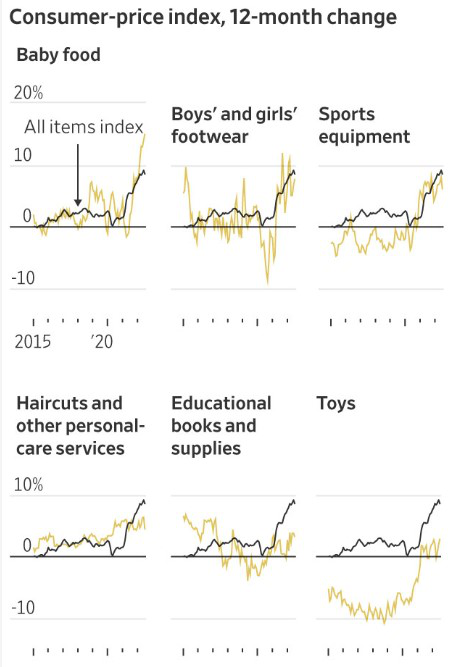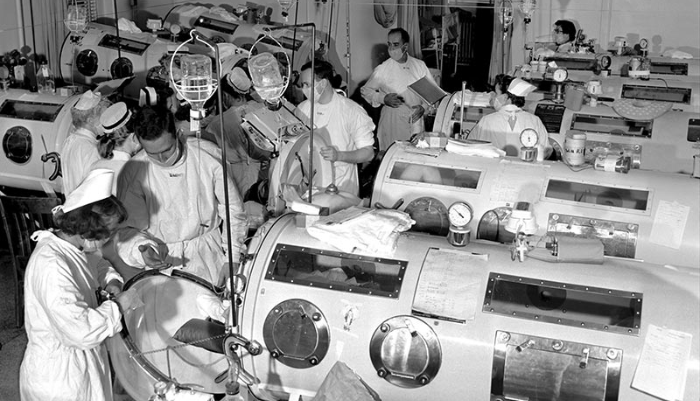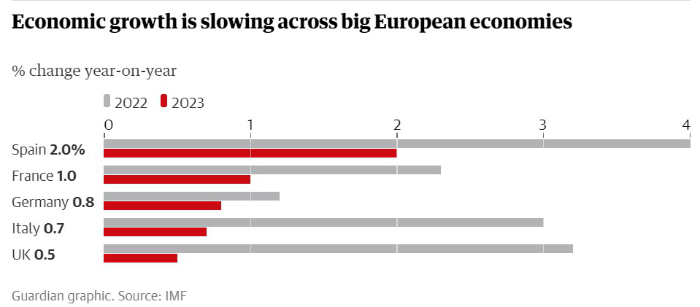In short:
- EIU says energy shortages and inflation will cause a recession in Europe in 2022-23.
- China’s shutdowns could disrupt the supply chain as much as Covid lockdowns.
- Omicron-specific boosters should be available in the US within three weeks.
Economy, supply chain, food security
The National Bureau of Economic Research (NABE) says 72% of economists expect a US recession by the middle of next year. 73% of respondents said they are not at all or not very confident the Fed can get inflation back to its 2% goal without triggering a recession. The economists surveyed were generally in favor of the Inflation Reduction Act.
More about the Inflation Reduction Act: Will the Inflation Reduction Act actually reduce inflation? Nine ways the Inflation Reduction Act affects Medicare coverage. How the Inflation Reduction Act Affects Food and Agriculture.
Citi updated its UK inflation forecast to cross 18% in January. This assumes a £300 policy offset on household energy bills between October and 2024. Citi expects an energy cap increase of up to £3,717 per year ($4,389), then a further increase to £4,567 in January, and then £5,816 in April from the current £1,971 for an average household. The price cap limits the amount a supplier can charge for.
The International Monetary Fund downgraded the growth forecasts for Germany, France, Italy, and Spain for 2023. The Economist Intelligence Unit (EIU) says that energy shortages and sustained inflation will lead to a recession in Europe in the winter of 2022-23. Winter 2023-24 will also be tough, with high inflation and sluggish growth.
China declared its first drought emergency this year as heatwaves have disrupted crop growth, threatened livestock, and forced some industries to shut down. Shutdowns like these could impact supply chains just as much as recent Covid lockdowns did.
Report: Raising a child in the US through high school can cost $300,000. According to the Brookings Institution, a middle-income, two-parent married family with two children would spend north of $310,000 raising a child up to 17 years. This estimate assumes higher inflation, like 1980-97, but doesn’t include college education or private education costs.

Here are five drought-tolerant plants that could help feed the world as the planet warms:
- Amaranth
- Fonio
- Cowpeas
- Taro
- Kernza
Amaranth is the #1 survival crop, according to community member Redneck. Check out his intro post about growing amaranth.
Climate change, environment, extreme weather
Heavy rain caused severe floods in Dallas. Parts of Dallas got an entire summer’s worth of rain in just 24 hours:
Major flooding continues in the Dallas area this morning. Cars are stranded and run the risk of being swept. Please be extra cautious if you have to be out and about and to NOT enter flooded areas!#dfwwx #txwx #weather #flood
— Weather Track US (@weathertrackus) August 22, 2022
As discussed in the Aug 02 roundup, you should never attempt to drive or walk through flood waters. But here’s another reason why it is best to avoid flooded areas 😱
Gator cruising the flooded yards and roads at Island Green near Socastee. Video via Stephanie Giguiere #scwx pic.twitter.com/k02o4wHu8Z
— Ed Piotrowski (@EdPiotrowski) August 19, 2022
Strong winds have caused a wildfire in Valencia, Spain, to get worse. The fire has so far scorched more than 47,000 acres along an 85-mile perimeter. Portugal, also experiencing a drought, is on alert for three days starting Sunday.
According to Global Forest Watch, forest fires are burning twice as many trees as they did 20 years ago. Russia and Canada experienced the biggest losses in forest canopy between 2001-2019. The US ranked third globally, with over 25% of forests lost to fire alone. And in Alaska, global warming causes fires to burn more wild land. Lightning storms, drought, and thawing tundra are making fires more destructive.
The River Oder mass fish die-off can’t be attributed to one cause. It could have been caused by a cocktail of organic and inorganic substances, algae bloom, and an industrial discharge. Germany is still investigating.
Many are still seeking shelter and food one year after the Haiti earthquake. Over 130,000 houses were damaged or destroyed, killing more than 2,200 people. Over 250,000 children still lack access to adequate schools, according to UNICEF. Reconstruction has been delayed due to a lack of funds and a spike in violence.
NYC denied every property damage claim from Hurricane Ida, citing a 1907 rule stating that municipalities across the state of New York, including the City of New York, are not liable for damage from ‘extraordinary and excessive rainfalls.’
Study: Already shrunk by half, Swiss glaciers are melting faster. Since the 30s, Switzerland’s 1,400 glaciers have lost more than half their volume. This could have broad implications for Switzerland’s long-term energy sources since hydropower produces nearly 60% of the country’s electricity.
Tel Aviv uses innovative lightweight fabric structures to provide shade during the day and solar-powered lighting by night:
Health
Boosters specific to Omicron should be available in the US within three weeks:
- The Pfizer shot should be approved first and available to everyone 12 and up who has completed their primary vaccination series.
- Moderna’s shot will likely be available in October to vaccinated people 18 years and older.
- Younger pediatric age groups may become eligible later for both shots.
The US National Institutes of Health hopes to launch its first big clinical trial of potential treatments for long Covid in October.
A CDC study examines monkeypox’s ability to stick to surfaces in the home. They found that 70% of the surfaces sampled tested positive, but the virus was inactive, suggesting that the virus decays over time or as a result of cleaning and disinfection. In Germany, a similar study found high viral concentrations of monkeypox on surfaces but no evidence of secondary transmission. According to the FDA: Viruses like monkeypox are more susceptible to disinfectants than other viruses. There are currently no disinfectants registered for use against monkeypox, but all products with EVP claims have been tested against viruses that are harder to kill. Here’s the EPA’s list of disinfectants for Emerging Viral Pathogens (EVPs), including monkeypox.
The first US polio case in nearly a decade highlights the importance of vaccination. Less than 60% of kids are vaccinated against polio in some NYC neighborhoods.
DR Congo is investigating a possible Ebola case linked to the 2018 outbreak.
Black Scientists are developing a pulse oximeter that works on darker skin tones.
The rest
Putin ally Alexander Dugin calls for ‘more than just revenge’ after daughter’s killing in a car bomb. Ukraine is preparing for a “particularly nasty” Russian attack this week ahead of Ukraine’s independence day on Aug 24, banning gatherings and celebrations. Western leaders are hoping the Russians will allow the International Atomic Energy Agency (IAEA) to inspect the Zaporizhzhia nuclear power plant to make sure it’s operating safely.
Apple is adding select models of MacBooks to its Self Service Repair program. The program will include the 2020 M1 MacBook Air and 13-inch MacBook Pro and the 14- and 16-inch 2021 M1 Pros, and it will continue adding more models in time.
A traveler put AirTags in her lost luggage, and they led the police to the thief’s home. Here’s how to use AirTags for prepping.
The hoarder next door: Chinese preppers stay one step ahead. A good article and interview with Chinese preppers.


You are reporting the comment """ by on